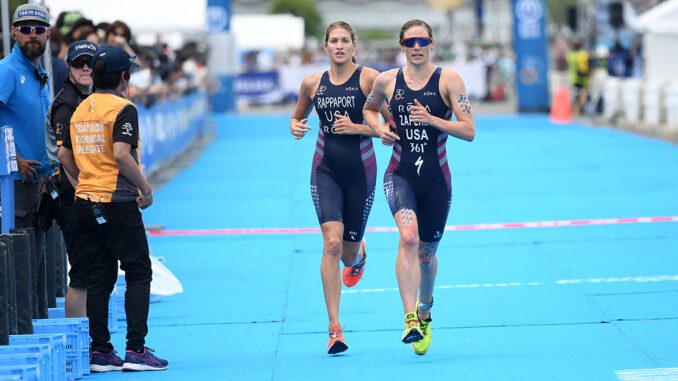
The Research Triangle is famous for being a hotbed of college basketball and home to the Durham Bulls, arguably the best-known team in minor league baseball.
What isn’t as well known is the high concentration of world-class women’s triathletes that have chosen to make central North Carolina their base of operation.
Two of the three members of the team that will represent the U.S. in the Summer Olympics in Tokyo later this month live in the Triangle. Although neither Summer Rappaport nor Katie Zaferes is originally from the region, both have found it to be an ideal location for their demanding sport.
“The Triangle has a lot of great soft surface run trails and quiet country roads for biking that makes the area a great place to train,” Rappaport said from the team’s pre-Olympic training camp in Portugal.
A Colorado native who swam and ran cross-country at Villanova, Rappaport moved to Durham when her husband’s job transferred him there in 2020.
By contrast, Zaferes’ move to Cary — also last summer — was made by choice after an extensive search for an elusive post-Olympics home base after a five-year stretch that has seen her and her husband spend most of their time out of the country training and competing.
“Google led us to Cary,” said the 2019 world champion, who grew up in Maryland and ran cross-country and track at Syracuse. “I had grown up going to the Outer Banks with my family, and it is one of my favorite places with some of my best childhood memories.
“I wasn’t really familiar with the Triangle area, (but) when we were deciding where to live it had everything we were looking for — an active community, good for our triathlon lifestyles now and having opportunity for the future. It was a place that just hit everything we wanted and more.”
Rappaport, 29, was the first triathlete to earn her spot on the U.S. team as the highest-placing American — and fifth overall — at the Tokyo ITU World Olympic Qualification event in 2019.
Zaferes, 32, joined her on the Olympic roster last month when she was chosen as a discretionary pick by USA Triathlon based on her No. 1 spot in the world Olympic qualifying rankings.
The third member of the U.S. team is 23-year-old Taylor Knibb from Washington D.C.
Although Rappaport and Zaferes have developed a friendship over their years of competing together on the world circuit, their different coaches and regimens don’t provide many opportunities to train together.
But thanks to their proximity to one another, there are still times when their paths do cross.
“Because we have two different training programs and also are both away often, our time when we are both in the Triangle area hasn’t been much,” Zaferes said. “We have managed to meet up a few times for rides, runs and an open water swim. It’s been fun to get to train a bit together while we are in the same area.”
Zaferes and Rappaport are both products of the USA Triathlon Collegiate Recruitment Program, a project designed to introduce the sport to young athletes with diverse skill sets.
Rappaport, for example, was a competitive swimmer good enough to earn a scholarship to Villanova. During her freshman year there, on a whim, she signed up to run a 10-mile road race that turned out to be a career-defining activity.
“My swim coach was a triathlete,” she said. “(He) recognized that my time was pretty good and encouraged me to talk to the cross-country/track and field coach about walking on to the team, and he also got me in touch with the USA Triathlon Recruitment Program.”
Zaferes ran track at Syracuse, specializing in the steeplechase, an event in which she set several school records. But she also had some experience in triathlon, having competed in one with her father on Father’s Day shortly after her graduation from high school.
“What really drew me to become a triathlete was the variation in the sport,” she said. “I love training in three different disciplines, trying to be better in each component of the race. It’s so multifaceted that there are always areas to be better.”
The Olympic triathlon consists of a 1.5-kilometer (0.93-mile) swim, a 40-kilometer (24.85-mile) bike ride and a 10-kilometer (6.2-mile) run.
Because of their respective athletic backgrounds, Rappaport and Zaferes agreed that cycling is the area in which they have the most room for improvement. Both, however, are good enough to be considered legitimate medal contenders in Tokyo.
After last year’s postponement, simply having the opportunity to compete is a victory.
As much as first-time Olympian Rappaport is looking forward to getting to Japan, 2016 veteran Zaferes is even more motivated after a difficult 18 months in which — beyond dealing with the coronavirus pandemic — she has also spent time recovering from a cycling crash and the death of her father.
“I am very grateful that I am getting this opportunity to race,” said Zaferes, who finished 18th in Rio. “I am really excited to use all that I have learned over the past five years. I feel like all the training, skills and experiences have just been accumulating, and come Tokyo, I will be ready.”



